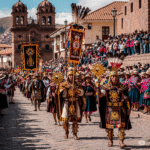In Ghanaian folklore, one small plant carries a big message about faith, humility, and the divine. It is the palm frond, known locally as Nyame Nti, which means “Because of God” in Twi. More than a leaf, this simple shoot became a national proverb and a moral guide — all rooted in an Ashanti legend passed down through generations.
The Story Behind the Saying
According to Ashanti oral tradition, there was once a man who lived in a small village during a terrible drought. Crops failed, rivers dried up, and food was scarce. Many in the village began to question their faith, but this man remained devout. Every morning, he would go out and collect wild herbs, praying quietly to Nyame, the Supreme God of the Akan people.
One day, while wandering through the parched bush, he found a small palm shoot growing — green, tender, and full of life. Amazed, he took it as a sign. With care, he nurtured the palm until it grew tall and strong. The tree provided him with oil, wine, leaves, and shade. When villagers asked how he had survived when everyone else suffered, he answered simply: “Nyame nti”, meaning “Because of God.”
Symbolism of the Palm

The palm tree is a symbol of resilience, nourishment, and spiritual trust. In Ghana, it is often used to teach children about the rewards of patience and faith. It also reminds communities that even the smallest blessings, when treated with gratitude, can grow into sources of abundance.
Unlike flashy symbols, the palm is modest. It grows quietly, without demanding attention. But its parts are used in everything — roofing, cooking, baskets, and even traditional medicine. This practicality aligns with the cultural value of sankofa, the idea that wisdom comes from returning to the roots.
Proverbial Wisdom
The phrase “Nyame nti” has become a widely used expression in Ghanaian speech. It is often said to explain unexpected blessings or to offer comfort during difficult times. When someone overcomes an illness, escapes an accident, or succeeds despite hardship, they might say: “It was because of God.”
Teachers use the proverb to encourage students to stay humble. Elders use it in storytelling circles. It appears in songs, sermons, and political speeches as a call to spiritual endurance.
The Modern Meaning

In modern Ghana, “Nyame nti” still carries weight. Street vendors might hang palm leaves at their stalls as a sign of protection. Families place small palm fronds in their doorways or on new houses as blessings. The phrase appears on bumper stickers, store signs, and school emblems, reminding people to live with faith even in uncertainty.
At the same time, young Ghanaians are rediscovering the phrase as part of a cultural revival. Artists incorporate it into murals and textile designs. Spoken word performers use it as a refrain. It is more than nostalgia — it is a way of reclaiming ancestral strength in a changing world.
A Leaf that Teaches
The story of “Nyame nti” is not just about religion. It is about trust in what you cannot control, and the humility to accept help from something greater than yourself. Whether you believe in the divine or not, the tale encourages gratitude, faith, and perseverance.
Like the man who found the palm shoot, we are all searching for something to hold on to during hard times. And sometimes, the simplest things — a green leaf, a small phrase, a quiet prayer — can become the most powerful.






